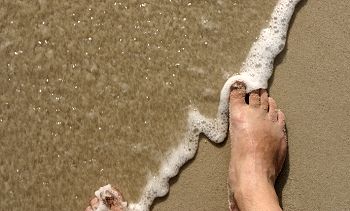Click here for www.PriceLine.com

|
On the most easterly side of the Caribbean Islands, just outside the main
arc of the Windward Islands, about 100 miles east of the Island St.Vincent
lies Barbados. Here Bajans still retain the classic British traits; driving
on the left, afternoon tea, and of coarse cricket, polo and croquet. Barbados
is awarded with having the highest number of repeat visitors in the region. For the lovebirds, ride the trolley through Harrison's Cave, hand in hand. Marvel at the cave's fantastic stalactites, stalagmites, waterfalls and pools. Take a walk through lush tropical greenery and exotic flowers in the Andromeda Gardens or the Flower Forest. For the waterbabies, Barbados offers absolutely everything for water sports. Swimming, diving, snorkeling, water-skiing and sailing are all offered. The strong, steady winds on the southern coast make Barbados one of the windsurfing capitals of the Caribbean. If getting wet isn't your idea of fun, you can still explore the underwater world in the Atlantis Submarine which submerges 150 feet deep to view wrecks and reefs. Also for the land lovers, Barbados offers great gold courses. The newest 18-hole Royal Westmoreland Course is a beautiful course set amid beautiful scenery. The local favorite fish to enjoy is flying fish. Also, Bajans enjoy coo-coo, made of cornmeal and okra, pepper pot which is a spicy beef and vegetable stew and jug-jug, a combination of cornmeal and pigeon peas. The average temperature here is 81 degrees in the summer and 77.5 degrees in the winter. Barbados is a great place to visit 365 days of the year! But don't forget your passport, picture ID, and a return ticket needed to enjoy this paradise. Barbados was uninhabited when first settled by the British in 1627. Slaves worked the sugar plantations established on the island until 1834 when slavery was abolished. The economy remained heavily dependent on sugar, rum, and molasses production through most of the 20th century. The gradual introduction of social and political reforms in the 1940s and 1950s led to complete independence from the UK in 1966. In the 1990s, tourism and manufacturing surpassed the sugar industry in economic importance. Historically, the Barbadian economy had been dependent on sugarcane cultivation and related activities, but production in recent years has diversified into light industry and tourism. The government continues its efforts to reduce unemployment, to encourage direct foreign investment, and to privatize remaining state-owned enterprises. The economy contracted in 2002-03 mainly due to a decline in tourism. Growth should be positive in 2004, the precise level largely dependent on economic conditions in the US and Europe. |